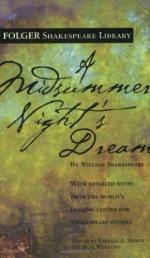|
This section contains 1,765 words (approx. 6 pages at 300 words per page) |

|
SOURCE: “The Gender of Metamorphosis,” in Allegories of Writing, State University of New York Press, 1995, pp. 113-48.
In the following excerpt, Clarke offers a Freudian analysis of the changeling child and his significance to Oberon and Titania.
Like the pharmakon that slips out of semantic control in the moralization of the Circe story, a similarly ambivalent trope—the “changeling boy”—decenters the daemonic action of A Midsummer Night's Dream. On the one hand, Shakespeare adorns his erotic comedy with a lyrical gamut of names of generated forms, signs of natural growth and abundance. This profuse texture is one reason why, on the surface, the play is so good-natured:
Oberon. I know a bank where the wild thyme blows, Where oxlips and the nodding violet grows, Quite over-canopied with luscious woodbine, With sweet musk-roses, and with eglantine. There sleeps Titania. …
(S 2.1.249-53)
On the other hand, even good-natured mischief...
|
This section contains 1,765 words (approx. 6 pages at 300 words per page) |

|


